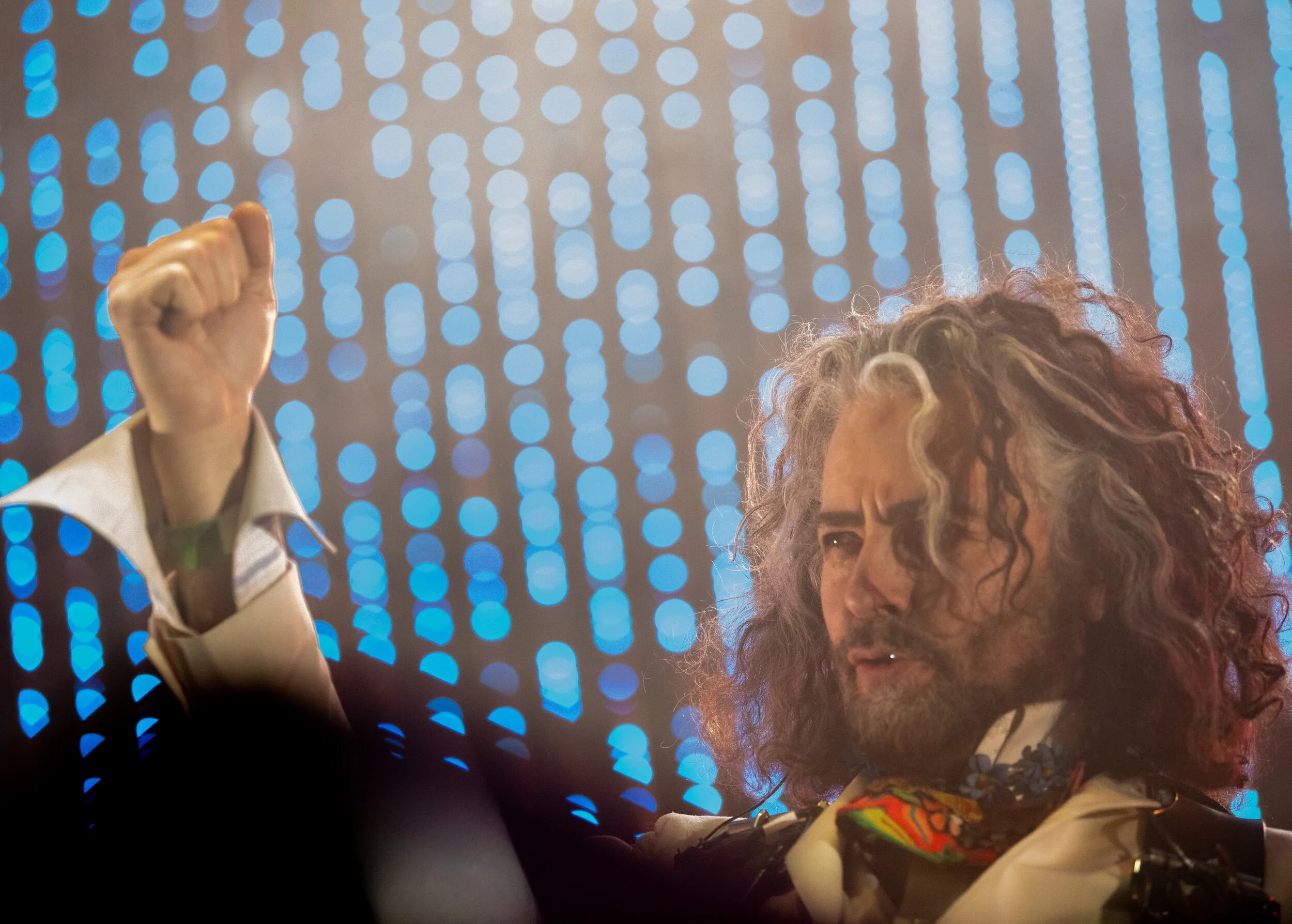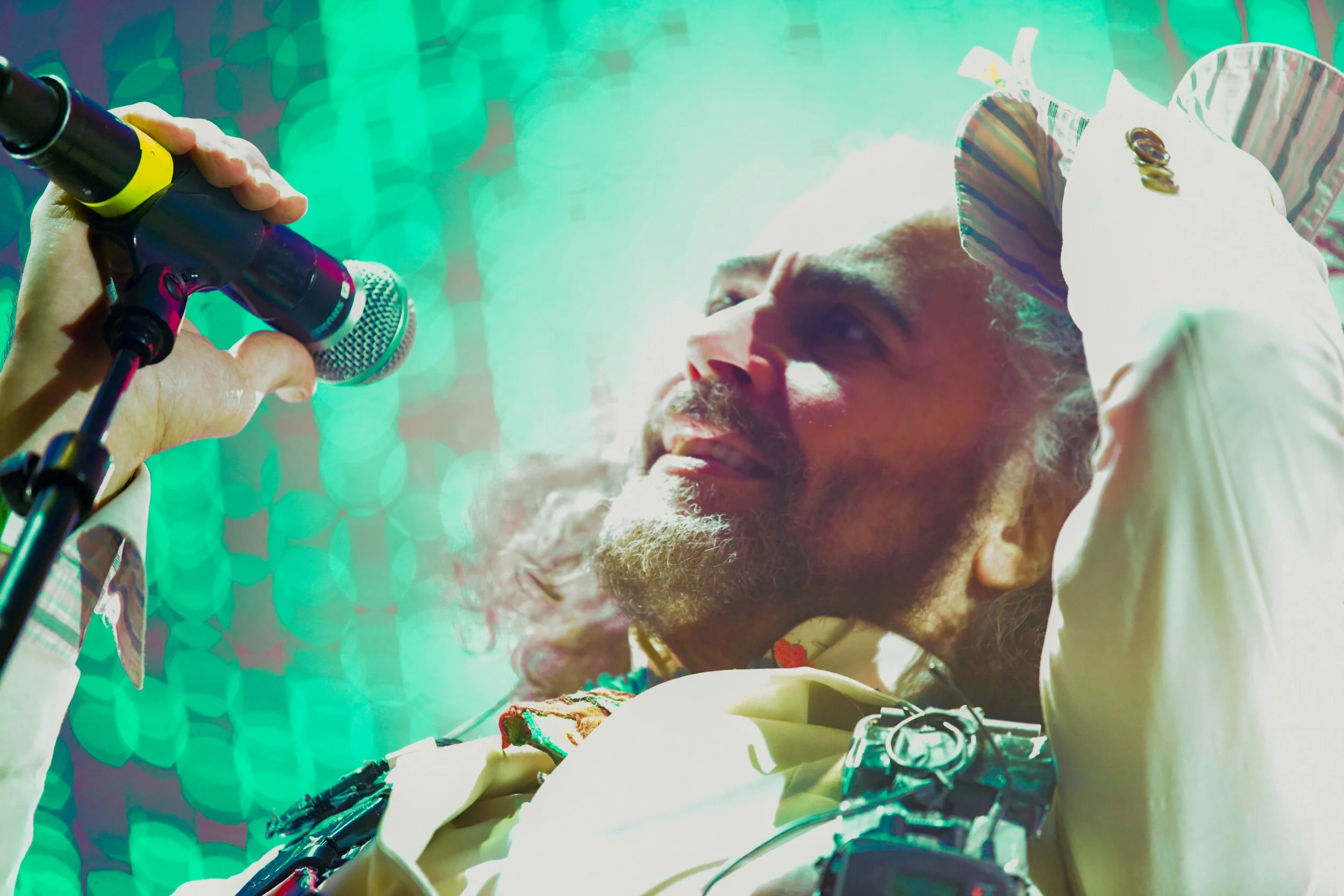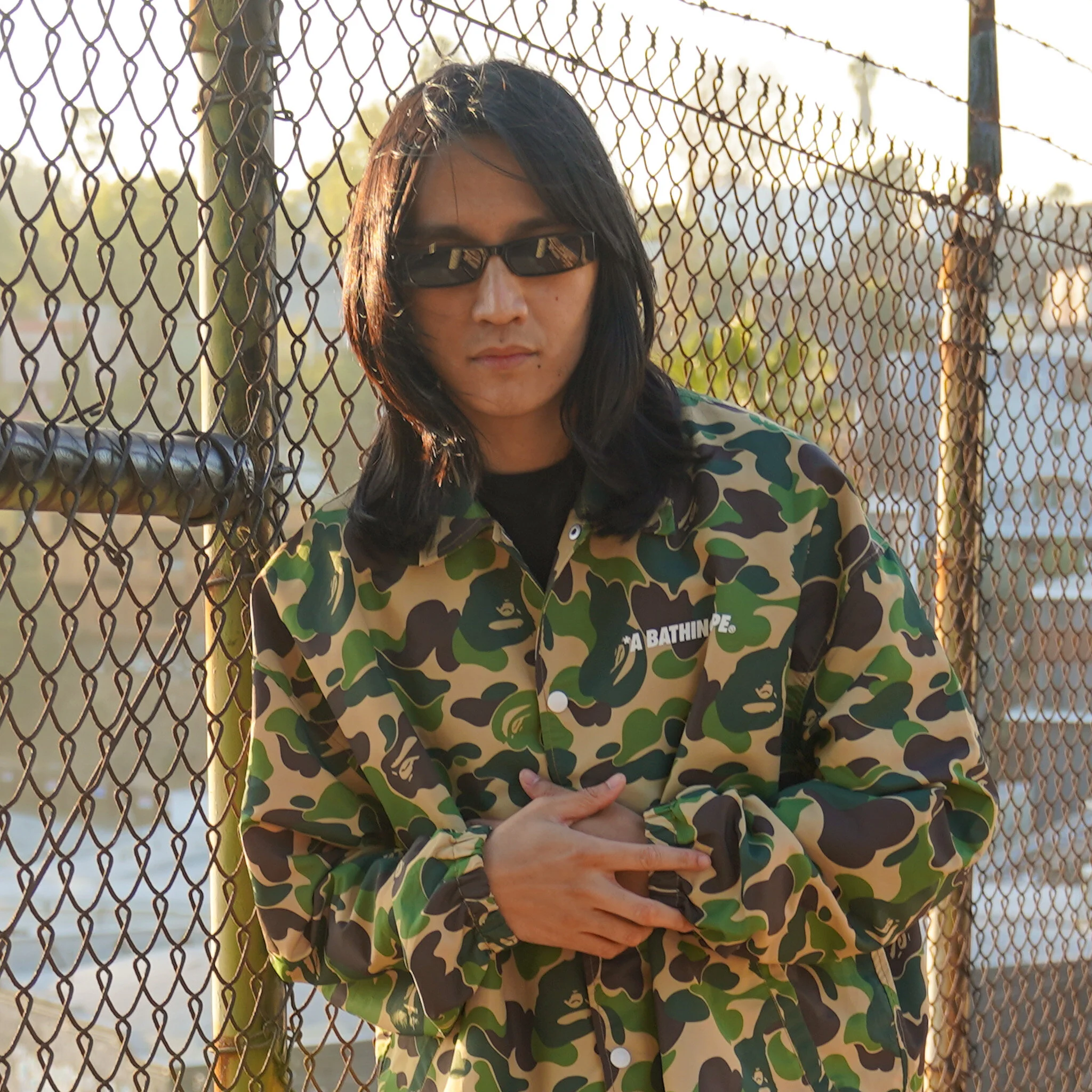Wayne Coyne Talks Classic Flaming Lips Collaborations, Staying Home During the Lockdown, and Life's Priorities
Wayne Coyne is so important to us here at WMF that it is nigh impossible to overstate his influence within not only our nook of the weirdoverse, but also the broader sphere of experimental pop music. With Wayne at the helm, The Flaming Lips have boldly and indefatigably devoted themselves to building a body of work that – after years of ingenuity, productivity, and creative fluidity – has become an ever-evolving universe unto itself. A living artistic narrative full of twists, turns, and wonder, this Flaming Lips universe is a phenomenon that simply is, seemingly impervious to the ebb and flow of commercial trends and expectations. Indeed, for nearly four decades now, The Flaming Lips have stood alone in their creative corner of the world, and yet all the while invited fans and artists alike to join them on their singular creative journey through music that is often as accessible as it is unusual.
Despite spending the majority of their career on a major label, the Oklahoma outfit has embraced, thrived in, and illuminated the margins of pop culture, masterminding a sprawling body of work that ranges from unabashed experimentation to flawless pop, and quite often seamlessly joins the two. As active and productive a band as ever, a track from The Flaming Lips’ most recent album King’s Mouth appeared on WMF’s Top 19 Tracks of 2019, and their collaboration Deap Lips (a joint-venture with Deap Vally) was released in March 2020. Considering all this, it’s a given that an in-depth one-on-one conversation with Wayne has been on our wish list for a long time.
The following conversation was both an unusual and rewarding one, unexpectedly occurring in the middle of the ongoing COVID-19 pandemic. While the original intent was to have an in-person conversation with Wayne, we gratefully worked within the confines of present-day parameters, and checked in with him via phone. Each of us situated safely in our respective residence, it was an honor and unparalleled thrill to cover an array of subjects with Wayne, including The King’s Mouth album, classic Flaming Lips collaborations, the recurring role of luck, and the intersections and priorities of both life and art.
Bobby Weirdo: I’m calling from my home to yours because everyone is staying inside as part of the current self-quarantine in an effort to fight the Coronavirus. So far, how is this situation affecting you, not only as an artist, but also as a person?
Wayne Coyne: For us, we don’t really know anybody yet that’s sick from it. You’re in this [situation] where it feels like something is going to happen, but it’s not happening to us. And that’s the dilemma. Until it happens to you, there are tragedies that are happening every day in your city already. It’s not our deal, because it doesn’t involve us.
Until it’s someone you know – your family or something – you always feel a little detached from it. If we’re lucky and we’ve all taken enough precaution, it’s not going to destroy us. It’s pretty strange that it looms over us for the next month and half or so, [and we don’t know] what’s going to happen.
BW: We were in New York as this situation escalated, and had to cut our trip short to get home to L.A., because it quite quickly felt urgent.
WC: I agree, because it’s either important or it’s not. You get on with your daily stuff that you had planned for months, and needed to do. You do them, and then suddenly, it has to stop. It has to be a collective effort. You can’t be at your house doing nothing, and everyone else is doing work.
That’s the message that needs to get out to everybody. This isn’t a time to catch up, and then get ahead of everybody who is back at their house. We’re all wishing we could do our work and earn our money, but this is more important than that. We get slightly annoyed with the people who keep on marketing, as if it’s business as usual. They have a new record out, and they want you to check it out. Dude, I’m not really paying attention to your silly record being out this week. I just think [some] people can’t get out of the mode of self-promotion.
It’s annoying, because social media like Instagram can be so fun and so ridiculous. We can show each other making pancakes at home, or whatever. But when something like this is happening, you want to be in some kind of solidarity with everybody. You don’t want it to feel like, “You’re all lazy, and I’m getting all my work done.” It’s a kind of opportunist thing, and I don’t really want to say anything about it to [those people], but they don’t need to promote their record this week.
BW: Exactly. So looking at priorities in this current era, what is your life like with the family these days? How do you spend your time on a personal level?
WC: Luckily, we had our little baby, and we had already carved out as much time as we could to just be here at home with him. I couldn’t have asked for a better scenario, because I’m very tempted to do a hundred things at one time. I’ve got a big team of guys ready to help me, and it’s easy to jump around and do a million different things.
So, we were scaling back anyway to just spend time with him while he’s such a little baby, and do all these things you get to do during the day. I do a lot of my work at home anyway: painting, making videos, music, and all that. A lot of times I’m collaborating with people, but a lot of times I’m not. Even when I’m collaborating with people – like I’m collaborating with you right now – we can do it using phones and computers. So for me, it’s not that different [to be at home], and I don’t feel any guilt about going out.
On any given weekend, there would be twenty things that people would invite you to, and you would feel like you should go out and see this band, or that art opening, or whatever. [You felt] a guilt because they’re cool things that you want to go to, support, and experience. For the last two weekends, though, there’s not guilt! It’s not just that I don’t want to go out, but this frees me up.
Katy and I are both cleaning up our house. There are people that are organized, and there are people that are disorganized. Katy and I are exactly the same disorganized people, and there are always more important things to do than cleaning out our car or house. So this is a chance to clean up. And I feel like that’s the message – stay in your house, and do whatever you can to stop yourself from going insane. Let’s all watch the news, stay up on what’s going on, and help in any way you can. But don’t get a rally together down the block – these are all things you have to do by yourself.
BW: You bring up fatherhood, and I’m interested in how that has affected you as a person and an artist.
WC: I’m fifty-nine years old, so what I think is cool wouldn’t necessarily be the same for a young guy that’s twenty, twenty-five, or even thirty, [which] these days is pretty young. I’ve had time in my life to be selfish, and do what I’ve wanted to do. Some of it has worked and some of it hasn’t, but I’ve been left alone to live my way for a long, long time. A lot of men are dead before they’re as old as me.
So, this is the beginning of a second life for me. Starting when I was about fifty, I was ready for whatever would happen. I’ve not gone to the moon and back, and felt like I’ve achieved everything, but I no longer had the [feeling] that my shit is more important than your shit. I feel lucky that that had diminished, and I loved that I was able to be with my family. And the band was like a family to me [as well]. We’d all take care of each other and help each other, and it didn’t really matter anymore that we were artists and musicians.
When you’re young, that’s a big deal, because it’s very easy to be sidetracked. You can think you want to be a musician, but become something else because opportunities come along. I probably worked too much and was too obsessive about creating music and art. So I think that when I was younger, I would have struggled with [being a father] and also trying to make money and do my thing. But by the time Bloom came in to existence, I was fifty-eight and was like, “Good — Here we go!”
I felt like I had been a father figure to a lot of guys anyway. I came from a big family, and had not only a great father and a great mother, but also older brothers and sisters. [I had] a giant family that always helped me do my stuff, so I was in a lucky position to be a stable entity for a lot of the guys working in and with The Flaming Lips.
Anybody who has a little bit of an imagination usually [considers] the worst-case scenario of what might happen if you’re not able to make money. Luckily, none of that is that relevant once you have a baby. Having a baby shrinks the world because he gets hungry, has to poop, and has to sleep.
I remember when my father was dying of cancer; it took three or four months to go from having hope, to being quite hopeless, and [then to] dying. But in that time, the world really just became very small – it became about our family and taking care of him. Of course, you’re always doing your internal creative stuff like music and art, but it all shrank, and I think in a good way. You can always jump on the Internet and think of a thousand things that you’re missing out on because you have to do the [creative] thing you’re involved in, and [being a father] let me not worry about any of that. I’m lucky that I’m not struggling to make money and find out who I am, [the way that] a lot of musicians and artists are doing when they’re young.
BW: You worked at Long John Silver’s when you were younger, and have jokingly said in the past that you kept that in the back of your mind as an option in case The Flaming Lips just petered out. Do you remember a specific time where you felt you hit a turning point and that somehow you would be able to support yourself for the rest of your life making your music and art?
WC: A long time ago, when we got signed to Warner Brothers around 1990. The Flaming Lips formed in 1983, but we weren’t like a normal band. Normal bands are full of ambitious guys who have some musical ability, or are from a musical family, or have family in the record business. The longer I’m in it, I wonder why The Flaming Lips would even have formed as a band. But we were very inspired by American punk rock like Sonic Youth, Black Flag, Minutemen, The Replacements, and these sorts of bands that we would see.
We weren’t trying to be the next Beatles or Led Zeppelin – we were just trying to be as cool as the cool local bands. And I think that’s the saving grace about any kind of music scene. You don’t have to compare yourself to the history of music – you just have to compare yourself to your friend’s band down the street. That was all we were trying to do. Anything beyond that – like how you make a record or get signed to a label – was just a great mystery. We didn’t really even know what those things were when we formed.
When the dust settled a year later and we were still around, we thought it was kind of cool, but still didn’t know what we were doing. We made another record and got signed to a label out of L.A. that ended up being a great label for us. They gave us money, let us do what we wanted, and before we knew it, we’d made a couple of records. But we’d clearly gotten out of the mentality that it could end any day now. We’d gravitated toward [the belief] that we could be musicians. We weren’t making any money, and no one liked us throughout the 80s, but we were learning a lot about how you can do it and not just hire a bunch of people to do it for you.
That’s [been] our saving grace. If we had been unfortunate enough to be successful when we didn’t really know what we were doing, it probably would have been the worst thing that ever happened to us. Luckily, we were just successful enough that I didn’t have to go back to Long John Silver’s. It was just enough to say, “I think we’re doing better as a band than if we were working at fast food restaurants.”
Once we got signed to Warner Brothers, it widened the scope of responsibility so we could focus on making records, how we were going to make money, and be able to tour, because those people were in it with us and believed in us. It felt like we had more help, but more at stake. Everything was heightened, and we didn’t feel like complete fools for investing our entire lives in it. We were signed to Warner Brothers, who had signed Jimi Hendrix and Neil Young. It was the big leagues.
The kind of money they offered us wasn’t a lot if you were a big band living in Los Angeles, but it was an insane amount of money for us, living in Oklahoma. I’m still living in the house that we bought when Warner Brothers gave us our first advance for our record. I told them we were going to buy this weird house we could all live in. We wanted to record down the street and rehearse there, and they said OK. It was so little money to them that they didn’t care, but for us it was an opportunity. We weren’t trying to become rock stars; we were trying to make great records.
I think that all that, and being signed in 1990, probably led to making The Soft Bulletin in the late 90s. Even if The Soft Bulletin hadn’t been commercially embraced, I think we all would have felt that we did that thing we were trying to do. We would have been satisfied that we made this really cool record, even if it didn’t work for us in any other kind of way in our lives. But luckily it did, and we were lucky that it took a long time.
I would say even now that if we didn’t have The Flaming Lips and this marketable name, I would not have any other skills other than being a fast food worker. That’s it – I’m either doing this, or I’m kind of homeless. There’s no in-between, but that’s the only way you can do it. You have to be in love with the great love of your life, and give every bit of your life to this love. If you don’t, it probably won’t work. I live by that. I’m going to give this everything I have, try everything, work as hard as I can, be as open as I can, and hope it is able to satisfy us artistically, satisfy us with money, and all that.
That’s the long answer to your short question. When we got signed to Warner Brothers, it made us say, “Fuck! We can take this seriously and go for it.”
BW: And the Flaming Lips, Roberta Petersen, and David Katznelsen together created something that is probably one of the most unusual stories in the combined world of experimental music and pop music. The Flaming Lips found an unlikely home on a major label, and you’re still on that label to this day.
WC: If someone would have said that back when it all started, we would have said, “Oh no, that’s just too important. That’s a big deal, and that’s not what we’re after.” We were all weirdos in the same way. Dave Katznelsen had ambitions, and he wanted to do cool music. I think he felt like his cool music would be successful too. I don’t think any of us thought, “This music is cool, but it won’t be successful.” We just thought, “Why not?”
When Roberta Petersen signed us, she was beginning to be more crazy than she was savvy. There was a time when she was savvy, and she got lucky, and she had a lot of momentum, professionally. By the time we came along, she had had so much success that I think she said to herself, “I’m just going to go with my gut feeling – I don’t give a fuck about anything else.” But I think she was also eccentric enough to the label that they thought, “Let’s let her do what she wants for a little while.” She was a great, crazy woman.
We weren’t that crazy. I always just thought we were normal weirdo musicians making our music, but we weren’t crazy. We weren’t trying to be egotistical rock stars. The thing that surprised us the most was that we just wanted to make cool music, and she was like, “I know, and I think you can do it.” It was great.
We were very lucky that The Soft Bulletin came at a time when some part of the world was ready for another dimension of music to happen. And then when Yoshimi Battles the Pink Robots was so successful, it was just sheer luck, because we weren’t really positioned to be a successful group. We just had our heads down, making our fucking weirdo music, like we always had. Part of us was like, “What do you mean we have to go play these festivals? We don’t like these festivals.” It sounds stupid now, but that was kind of an interruption of what we were all about, which was making records. We weren’t really marketing ourselves as anything.
But at the same time, we were glad to have something else happen. By the time of The Soft Bulletin andYoshimi Battles the Pink Robots, we’d already been a band for twenty years. We’d already kind of done everything we thought we wanted to do, because we were young freaks that wanted to go out into the world and do crazy shit. But we found that we really just did – and still do – love making records. We wanted to do that more and more, so everything that would succeed was letting us make another record. And even now…everything that succeeds right now lets us keep making records, movies, and whatever.
But I agree. When you look at the music that we were making, the times we were making it in, and the people who were involved, it’s an unbelievable story. I would never tell any young person to do what we did, because it’s insane, and would probably never work again.
BW: Right in that era in-between Zaireeka and The Soft Bulletin, it seems that there were a several ingredients that made the time what it was for The Flaming Lips, including kindred vibes with Mercury Rev, and Pro Tools entering your recording process. Is it during this time that Flaming Lips became Flaming Lips so to speak? Even though you’d been an established band for years, with undeniable successes in the form of TV appearances and radio and MTV airplay, was this time the biggest turning point for the band so far?
WC: It’s probably the combination of all that. If we hadn’t had any success, [it would be] easy to stand on the sidelines and say, “If we got our shot, here’s what we would do.” Having some success lets you get in there and see what those things are all about. Being on MTV, television shows, and all that…those are the things that if you’re not able to do them, you say, “Fuck, man! We’re cooler than they are. We should do that, and if we did it, it would be the coolest thing ever.”
You do those things once and it scares the shit out of you, you do them twice and it’s fun, but after you do them a couple times, you [realize] it’s not what you thought it would be. It changes your view of it. Even playing festivals – until you do it, you really think it’s something else, and once you do it, you say, “Well, it is this, but it’s also that.” That’s being open to things, and trying to learn from them.
Some of it was that we were connected to a part of the grunge movement in the early 90s that we really loved – homemade, cool, freaky rock. We would have thought of ourselves as somewhere between Nirvana, Sonic Youth, and R.E.M. In the early 90s, all that would have been cool. But as grunge moved along, it was more attached to groups we didn’t like. They’re probably fine, and we’re too harsh about it, but we were connected to Stone Temple Pilots, Candlebox, and even Soundgarden. People loved them, but their heaviness just never appealed to us.
Bands have their four or five years where they accelerate and accelerate, and burn themselves out. From when we got signed to Warner Brothers until about ’96, we were playing a thousand shows a year. I remember one year when we played Chicago fifteen times in one year. At the time it was a thrill [to be] going and going and going, but it did burn out some special element in us.
When Ronald Jones left the group after Clouds Taste Metallic, I think something was going to give. Steven was addicted to heroin, and Ronald was starting to go crazy. I was probably going crazy in the other way – starting to get even more ambitious, and thinking, “Fuck it – we can do anything now that we’ve done these things.”
When he left, it was a great excuse to not do what we used to do. It was like, “Well, good! Even if we wanted to, we couldn’t do that.” It’s kind of like this Coronavirus – even if you wanted to, you can’t. So I started doing The Parking Lot Experiments because we weren’t going to be on tour. At the time, it only seemed like it was going to be a couple of months, and then it turned into six months, and that turned into a year.
Previous to Ronald leaving, Steven was the drummer. He and I had spoken about him not being the drummer, and I said, “Fuck it – let’s do whatever we think we should do.” He felt very [uncertain about] how he would go from being a drummer to being a singer and guitar player. I said, “let’s do it – fuck it!” but there was a lot of hesitation from everybody else. But when Ronald left, we thought we should just do that, and if it failed, who cares? It felt like we had nothing to lose, and that’s a great time for an artist.
Steven not being restricted to just being a drummer who occasionally wrote songs totally opened up something we never would have explored if Ronald Jones was still in the band. Steven ended up being an insane musical genius. Once he and I set to it, I was ready to take on whatever, and he was able to do it. He could arrange things and figure out the music theory to help it sound like that.
Steven and I both know that if Ronald was there, we would have just focused on what he was able to do and if we could make that work. It wouldn’t have been as self-indulgent as we were getting with Zaireeka, and that turning into The Soft Bulletin. One part of it was just shit falling apart, and another part was that we had nothing to lose by trying. That really doesn’t happen very often, because you go from having absolutely no ego or anything to lose, to being back in it again. Then you have stuff to lose, people to hate you again, and people compare you to stuff again.
But it was mostly luck. Mercury Rev were having some success, and Dave Fridmann was working with us and working with them. It sort of felt like we were creating a little pocket of a music scene. We were all into the same things anyway, so it wasn’t like we were doing it on purpose -- it was just kind of happening. We were always listening to what each other were doing and helping each other.
So when [Mercury Rev] started to have some success – mostly in England – they took us on tour with them. Then our record came out, and it felt like these two pioneering American bands were changing music. We were lucky that there was this little moment in time where people wanted something slightly fresh, and them and us both having a little success made it feel like something was really happening. Before too long, there were Sparkhorses and Wilcos that were a part of that, and to us it felt a lot better than a grunge thing.
BW: Rewinding quickly to that era when Steven was drumming, Eddie Ruscha told me he has a memory from when he was in Medicine touring with Flaming Lips, and you – justifiably – bragged to him that even back then Steven could play the entire Loveless LP on the piano. Do you remember that?
WC: Oh yeah. We already knew that Steven was kind of an advanced freak. One of the first rehearsals that we did, we were working on David Bowie’s “Life on Mars”. I was trying to figure out how The Flaming Lips would play it. We’ve done that before with complicated musical songs, where we just kind of simplified them and said, “Well, here’s how we’re going to do them.”
Steven always really liked that, but I remember saying to him, “What do you mean we simplify them?” He said, “Well, these chords that you’re playing aren’t really the [original] chords.” I remember him working out a very complicated Rick Wakemen arrangement in the van on the way back from rehearsal. He didn’t have a piano, guitar, or anything – he was simply doing it in his head. I watched him, and his hands were moving as if there was a keyboard there. He had figured it all out, and when we got to his house, he played it.
So we already knew he was able to do all that, but we never [considered] if that was important. All avenues of music to us were open and important. It wasn’t music theory that we thought was important, or being a savant. None of that was important; we were just trying to get to our vibe. But we knew he could do that, and we loved it.
We thought that was the direction that The Flaming Lips would be about. It was – and still is – an insane love of music, and creating music. It’s not to be rock stars, or important, or whatever. It’s to be able to be in that flow, part of what’s going on, in awe and in love with what’s going on, and to be in the thing you’re in love with. There’s nothing [else] like that. Even though we’re older now, you can still get caught up in that part of it, because what you’re creating is part of what’s happening, and what’s happening is influencing you [as] you’re influencing it. It’s amazing.
BW: You’ve brought up how The Flaming Lips have collaborated with others, and I wanted go into some of those collaborations. The Deap Lips album that you did with Deap Vally was just recently released, and there are some other collaborations in recent years that I’m especially curious about.
The first one that jumps out is Mick Jones. I know you’re a Clash fan, so there might be that connection, but it was just such an inspired choice for him to be the narrator on the Kings Mouth album. How did that come about?
WC: You’re exactly right. There’s something eccentric, gentle, and loving about the way that he mumbles. I don’t know what corner of London he’s from, but I love that sound. He belongs in a Charles Dickens novel or something.
When we play shows around London, lots of people will show up. Don Letts – who is in Big Audio Dynamite – is a Flaming Lips fan, and lives next door to a British artist whose name is Georgia. Collectively, they are big Flaming Lips fans. I’d met Don quite a few years ago, but then when we got to know Georgia in 2016, we took her on tour with us in 2017, and she we would bring Don to even more shows. We got to know Don more and more, and I asked Don about Mick more than one or two times backstage.
When it came time to get the narration, I thought, “Let’s just see,” because I didn’t have anyone particular in mind. Steven, Michael [Ivins], and I didn’t really feel like it should be us. I’d been talking to Don, and listening to interviews with Mick Jones. I knew Don might be able to persuade Mick, [who] was my first choice. I told Don I wanted to see if Mick would do it, and as I had thought, Don was like, “Fuck it – I’ll get him to do it! Don’t worry about it.”
I put things I thought were going to be the narration together. Some of the narration had already been made because we had made the King’s Mouth traveling exhibition. So, quite a bit of it was already done, and I didn’t have to think of everything quickly. I sent him the narration, and I didn’t really know what was going to happen. Three weeks later, it all just came back.
By then, we only had half the album finished, but once this narration came in, we had to finish because it made [the album] so much better, more cohesive, and entertaining. So it was that – knowing Don, that Mick would do it for Don, and Don would do it for me. I’d already heard bits of Mick’s voice anyway, listening to Clash songs. Some of it – where it’s hard to tell who’s doing what – could have been Joe Strummer, but I was already hearing the voice of that mush-mouthed, eccentric person on some of their passages on Combat Rock. Like I said, I didn’t really have anyone else in mind, and when he did it, I thought, “How lucky is that?”
It really did crystalize the whole thing. No one else is ever going to do music like this. Kings Mouth was a record we’d been working on for three or four years already, and we were lucky it was being pushed together while we were doing other things. It was a great collaboration. I didn’t know Mick before then, but since we’ve done it, I’ve met him a couple times backstage. We’ve talked and we got to tell him how much we love him and appreciate him, appreciate his own music, and for being part of our thing.
BW: I think The Clash was one of the references –at least conceptually – for the Flaming Lips album In a Priest Driven Ambulance, and you’ve mentioned The Clash for years, so I think that collaboration is a great full-circle moment.
WC: In a sense, they were one of the groups that banded together in the way The Flaming Lips got together. It wasn’t because they were going to be rock stars. They felt this thing inside them that said, “We must be a band.” We always felt very inspired not just by their music, but by the way they lived and did their group. They were great brothers in arms.
BW: Was Harry Nilsson’s The Point a reference or thought while you were making King’s Mouth?
WC: For sure – always. Since I heard it when I was ten years old, or whatever, I always loved it and wanted to try our own version of a story like that. I think even the way Steven and I present the podcast that we do sometimes has that type of narration. It’s hard to explain, but it’s casual, smart, and funny without ever dipping too much.
It was always a reference for King’s Mouth. There are things on The Point that I don’t listen to because it’s too much narration, but by the time we were doing it, I thought that was OK. Not every record is meant to be listened to ten thousand times, like your favorite song of all time. It can be something you listen to when the mood strikes you, and not every day.
And it’s not just The Point. I think The Point, and probably Dr. Seuss’s How The Grinch Stole Christmas. When that [was re-released] in the early 90s, you could get the audio from that, which was only about twenty minutes long. We’d listen to that like we would listen to a Rolling Stones album. We’d just listen to it – the narration, the music in the background, the songs, and lyrics. So all that, but also thinking that there’s probably no other group that would even want to do this kind of music. Sometimes, we do think, “This is music that only Flaming Lips are going to do, so we have to do it. If we don’t do it, it will never exist.” Kings Mouth is definitely one of those types of albums.
BW: Another narration I wanted to ask you about goes back to Oczy Mlody. Reggie Watts appears on “There Should Be Unicorns”. How did that come together?
WC: We played Sasquatch Festival just outside of Seattle, and Reggie was in a comedy tent. I already knew some of what he was doing, and we were playing that night, so we went over to his show earlier in the day. It was great, and what I thought it would be – he was funny, musical, and he was making up shit on the spot. As soon as he got offstage, I said, “We have to make some music together.” He said, “We do; you’re right.” We got each other’s numbers and would text each other about once a week. Before we did “There Should Be Unicorns”, anything that I was doing –which was a lot of stuff – I would try to get him to do. There were probably a hundred things. I don’t know if they would have worked out, but I thought, “let’s just keep trying.”
I had this song “There Should Be Unicorns” that sort of hinted at a futuristic story. I wrote down some stuff and sent it to him. I didn’t know if he was in the middle of doing a big project or TV show. I would just send things to him and say, “What do you think?” For whatever the reason on that, he just took right to it, and did it immediately. When the engineer Dennis and I got it back, we said, “Fuck! This is really going to work.” It worked [out] better that you don’t know what he’s really talking about [even though] it assumes you do. I liked it even more [that way].
When we were invited to do one of Neil Young’s Bridge School benefit concerts. I said, “Reggie, why don’t you do this and that with us?” He asked what we would do, and I said, “I don’t know – we’ll figure out something.” He boldly just jumped in and did [that one] with us, and a Beatles cover, or something like that. It was great, and him just jumping in [like that] is the spirit. We all really like being around each other. But again, it was just sheer dumb luck that he had the time, did it, and it turned out great. I listen to it now, and just think, “How did it get to where it got? What a great track, and I’m glad we’re the ones who got to do it.” It’s such a weird piece of music.
BW: One of my favorite Flaming Lips collaborations is the Miley Cyrus/Ariel Pink track with you, “Tiger Dreams”. I’ve seen one photo from that session. What’s the background to that collaboration? It’s a truly remarkable group of people in one room.
WC: It really is. There are not many people in the world that could have an appreciation for “This doesn’t happen. This is fucked up and so cool and weird.” I may have a video of that.
Some of Ariel’s music is the best music there’s ever going to be. You listen to some of it and think, “I can’t believe I know the actual human that’s made this music.” We love some of his music so much, and we love that he’s such a weird fucking dude. He’s not just playing at it like a marketable pop singer. He plays it like, “Oh, my music is just dumb pop like everybody else’s music.” But once you know and meet him, you’re like, “What the fuck is this?” He’s a great mysterious wonder, and you do get a special energy being around him.
Steven was there, I was there, and Ariel wanted to be around Miley. That was part of the weirdness about it – he was like, “Sure, I’d love to record a song with Miley Cyrus.” Most people we would talk to – around that time especially – would ask why we were doing music with her, and we’d say, “We don’t know. It sounds insane. Why not?” But [Ariel] was one of the people we’d talk to who would say, “Fuck yeah! That sounds exactly like what we should be doing.”
We would have these nights where we would be recording at Miley’s house. At that time, she had a studio just off to the side there. So there would be a party at Miley’s house with lots of drugs, lots of booze, and lots of freaks, but in the meantime, we could go out to the studio, and it was all ready. If we could, we’d get some music out of it, and that’s how most of it would go. We’d create a lot of music out here in Oklahoma and then take it out there, but would get into these scenarios where it was 1:00 in the morning and you’d only get fifteen minutes where they’re actually in the studio, doing something that you could record.
Ariel is kind of Dr. Jekyll and Mr. Hyde. Part of him is very creative and fun, and he’s up for whatever. But then, it can all switch to where he’s the man in charge. You’re going to do what he says, or he’s going to fucking punch you, and I love that. I want that to be exactly what is happening.
We pretty much had the song, and we were satisfied with Miley’s singing. By the time Ariel showed up, I knew that he loved the song, and that he was going to be on it. He just set to it. We talked about his layering of harmonies, which Steven and I are in awe of all the time. I think he was slightly engineering his own session, even though our engineer Dennis was there with us. He’d say, “No, you have to turn that EQ up…it’s this, it’s that.” We all loved [that]. The more he got into it, the more insane the session got, which I think he knew.
I think we all knew we were doing something that was cool as a song, and it’s cool as a recording, but it was also cool just to be alive right then and there in that room. No one else in the world was going to know except us. And it’s always like that [with Flaming Lips]. Forty percent of why we’re there is because we’re going to make this cool recording that lasts forever, but sixty percent of why we’re there is that we want to be there right then in that moment that will only be right then, and then disappear. That was definitely one of those nights.
It’s the same with Ariel –we’re always inviting him to do stuff. We’ve been on tour with him in good times and bad times. He’s just a great, dynamic character. You can’t get better than that, and we do so love his music. The icing on the cake is that you get to be around this person whose music you really love.
BW: I’ve always been curious about the Flaming Lips song in The Spongebob SquarePants Movie. Patrick says, “It’s some kind of wall of psychic energy.” That line is so Flaming Lips, and then the song you did for the movie appears to be at least partially based on that. I’ve always wondered if you had a version of the movie that you saw during production, and based the song on something that inspired you, or if you were prompted with something particular?
WC: The creator, Stephen Hillenburg, handpicked who he wanted to do the music for the very first SpongeBob movie. He picked us, Ween, and some other groups. It was a pretty special event, and [we thought] if he wanted us to do it, we [should] do it. Back then, the movie was so guarded that they flew to Oklahoma with a DVD player that they brought, took a limousine to our manager’s house, and played the DVD of the movie as it was being made. It wasn’t finished, so some of it was just sketches, [but] it was amazing.
They showed us about twenty minutes of the movie, and gave us a couple pointers of what the song could be about. Then, they unplugged the DVD player, took the limo back to the airport, and flew off two hours later, [as if they were] the Secret Service showing up to give you an immunity shot or something. It was insane, but that’s how everybody did stuff back then. They didn’t want anything getting out and stolen.
I remember the very first thing I saw [had] the line [about] the psychic wall of energy, and I thought I definitely would make that. When I heard it, I thought that was something the Flaming Lips would have written anyway. We kind of had a little bit of a song that we didn’t know what to do with, so that always helps. You’ve already got a little bit of something brewing, and you get to throw some ideas over it. That little [sings ascending riff] part of the song was improvised, and I thought we needed to bounce along and make it more fun.
That was the symbiotic world of Flaming Lips and SpongeBob. There are a lot of druggy, imaginative, fantasy, freaky, ordinary coincidences. And it has such an innocent heart, which is why we’re drawn to it. They really are friends who care about each other, and it’s based on something that you can relate to.
BW: I saw Yoshimi Battles the Pink Robots at The La Jolla Playhouse, and it was really one of the most exceptional music experiences I’ve had. Beforehand, I was concerned that seeing and hearing Flaming Lips songs performed in that context might not work, and that it might be cliché Broadway-sounding. It wasn’t that at all, though, and years later, I’m curious about how that experience sits in your memory and heart. Did it go the way you wanted it to go?
WC: We [already] knew the creator and director Des McAnuff. He’s done lots and lots of successful Broadway musicals, and we’ve seen a couple of them. Knowing him is where it all changed for us, because he is such a cool, wonderful guy. Of everybody in the world, he probably loves and knows our music more than anybody.
When we sat down with him, he started telling us his idea of how he wanted to make this musical, and he would mention things in [our] songs where Steven and I would say, “What are you talking about?” He would mention [particular] lyrics, and the chords underneath them, and examined on an emotional story-telling level what could happen. Steven and I had just made [the music], and didn’t really know what it meant, so these were things [we hadn’t thought about].
I still talk to him all the time, and absolutely love him. We believed in whatever he wanted to do with the Yoshimi Battles the Pink Robots and Soft Bulletin music, and that he should do so without worrying about what it meant for the Flaming Lips, because he’s such a great guy. If you were around him for one minute, you would feel exactly the same about him as we do. He does everything out of love – not because he needs another success, because he needs the money, or needs people to think he’s cool.
He got connected to Yoshimi Battles the Pink Robots when his wife’s father was dying of cancer. He was making the trip from La Jolla to L.A. three or four times a week, and we had been in contact with him about maybe turning Yoshimi into a musical at that exact time. During those couple months of that journey back and forth, he kept listening to this record as his father-in-law was dying in real life of cancer.
He started to put this thing together, and I knew that, because we would talk all the time. He said, “I don’t know what you think Yoshimi is about, but I’m feeling it could be about this.” I thought that was amazing, because he was doing what we want to happen to our music. It could mean anything, and he made it a deep, personal, specific thing. That’s the greatest compliment a musician or artist of any kind can have. He took this thing that is kind of universal, and made it his own, spectacularly personal thing.
He invited us to rehearsals, and I think he was always worried that we would think it was too hokey, but we were never going to be like that. And then once we saw it, we loved it the same way you did. It has such a heart, tells this story, and if you know that music, it’s almost too much. I sat next to a woman at the opening who had cancer herself [when] we saw it, and she cried the whole way. And that makes you cry – it was devastating.
Part of us would say, “Des, it’s too devastating. No one wants to come to this play, because it’s too heavy'“. But I think it’s perfectly heavy. In time, I think he’ll probably do another version of it, and maybe he’ll want it to be more uplifting. But at the time, it was so perfectly what he wanted it to be that we were utterly blown away. I’ll always remember that night. We’ll probably be friends for the rest of our lives, and I’ll always be interested in what he’s doing.
Again, that was just great, dumb luck that we ran into this guy at this time in his life and this music started to create something else in his life that he was going to be the creator of. To be around creative people – but also people that are men of action – is what I like to do. I don’t want to just dream about it. I don’t just want to talk about it. I want to do it. When you’re around other people that have that same spark, it helps you. With Des, Ariel, Miley, Don, and all these people we’ve talked about, I think we see that spark in each other, [and say] “If you do this, I’ll do that, and we’ll make it happen. It will become real; it won’t just be an idea.”
BW: Did you ever sit in the room with Aaron Sorkin during the process of creating the Yoshimi musical, or was that just a vague possibility?
WC: We did. I regret that I stood my ground as much as I did, but we met with Aaron on a very strange day. There was a play that was opening on the day we had the meeting, and there was a strike on that day in Manhattan. He wanted to have the meeting with Des and me anyway to talk about what we all thought Yoshimi Battles the Pink Robots could be. So, it was not a good day to stand up for my beliefs.
He wanted to make it about George Bush and 9/11. At the time, I just didn’t want that. I didn’t like George Bush, and I didn’t want it to be political. I liked it being a human story, and not connected so much in time. He had a really great, thrustful [sense of] “I want to do this this way,” and I just said no. I think it was probably the first time someone had said no to him in fifty years, and he probably looked at me like I was such an idiot for saying no to that.
But I didn’t really think about it in terms of if I was turning down something that was going to be insanely successful. Sometimes you do have to live with something because it’s successful, and if you don’t like it, it being successful can be a torturous thing. At the time, we didn’t need the money, and we weren’t looking to be rock stars, or more famous. So I simply said I didn’t want it to be that, and I think the whole room kind of went, “Oh no.” But that’s how I felt, and I never heard from him again.
I kind of regret it because it would have been another strange adventure. But it would have stopped Des from making it the way he wanted to make it, and I knew that as well. Des had an idea, but we also both thought we couldn’t turn down Aaron being involved. So, I just took it upon myself to do what we wanted to do. That’s how it goes.
BW: Coming full circle on this conversation, at this point I typically might ask you about what you have coming up project-wise. But considering the current situation the whole world is in right now, are you thinking that way these days, or are you more wrapped up in the moment?
WC: I think everybody’s mind does the same thing. You can be a thousand percent in the moment, but it doesn’t stop you from looking ahead and thinking, “What’s going to happen to my family?” and all that. We are in kind of the middle-zone. The bombs aren’t falling on us, but they are falling on other people. So we don’t have that adrenaline of, “Fuck – this is all that matters.” Our days are relaxed. You’re listening to news and doing what you think is right, but it’s not an adrenaline-filled dash for shelter.
You don’t think it’s going to last forever, and you don’t think it’s the end of the world, so you do think, “Well, by the middle of summer, let’s hope the world has gotten past this and we can all see if we can go back what we were doing before, or if the world has changed, or if we’ve changed.” It would be stupid not to think that, and thinking of the future is always part of what is in a responsible person’s mind.
Luckily for us, we weren’t going to be that busy during this time anyway. We were going to get busier as the summer rolled along, and we’re not in that precarious [situation] where if we have a bad couple of months, everything would fall apart. The Flaming Lips have already been going almost forty years anyway, so we’re kind of in this thing.
You worry that the world – us included – may have been just skating along, doing what we thought was important, and when we come out of this, maybe it’s not important. The big festivals, all of us showing each other [on social media] what we’re doing on this particular night…maybe we don’t need to go ten thousand miles an hour simply because we can. I don’t know.
If you think about it in an historical way, there’s just no comparison between how people thought in 1959 and [how they thought] in 1969. Things happen that do change your priorities, and the way you think about the world. But again, I would welcome all that, and whatever this change is, we’re all going through it together. I hope it doesn’t destroy our way of living, but I welcome going with the flow. I feel like The Flaming Lips have been insanely lucky to have what we have, and it wouldn’t surprise me if it were all taken away with a change.
But I don’t think that [is going to happen]. Music and art are always going to be with us, and always going to be important. But it’s only important when you don’t have to worry about your grandmother and your baby succumbing to this virus. Then, music and art are great. And that’s exactly the priority they should be.
I’ve said for a while, “Family first, my music second, and I’m third.” I like that, so this is the time when our family comes first. And I think art should only exist in that way. Art shouldn’t be the thing you care about – it should be about the things you care about. That’s what this will prove to the world. Do you care about your art, or do you care about us? Because we want your art to be about you caring for us, and not about you. I think this will prove that.

















